2020
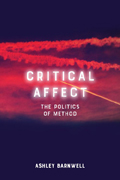
Barnwell, Ashley. Critical Affect: The Politics of Method. Edinburgh University Press, 2020.
Critical Affect explores the emotional complexity of critique and maps out its enduring value for the turn to affect and ontology. Through a series of vivid close readings, Ashley Barnwell shows how suspicion and methods of decoding remain vital to both civic and academic spaces, where concerns about precarity, transparency, and security are commonplace and the question of how we verify the truth is one of the most polarising of our age. Weaving together both the critical and affective dimensions of ‘paranoid reading’, Critical Affect opens crucial questions about the ethics of practicing theory and offers a new route into the critical study of affect. More information...
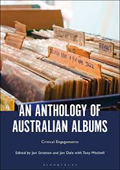
Dean, Elizabeth and Knox, Roger. “Roger Knox & The Pine Valley Cosmonauts, Stranger in My Land (2013); Roger Knox, Give It a Go (1983),” in Dale, Jon; Stratton, Jon and Mitchell, Tony (eds.,). An Anthology of Australian Albums Critical Engagements. Bloomsbury Publishing, 2020.
An Anthology of Australian Albums offers an overview of Australian popular music through the lens of significant, yet sometimes overlooked, Australian albums. Chapters explore the unique qualities of each album within a broader history of Australian popular music. Artists covered range from the older and non-mainstream yet influential, such as the Missing Links, Wendy Saddington and the Coloured Balls, to those who have achieved very recent success (Courtney Barnett, Dami Im and Flume) and whose work contributes to international pop music (Sia), to the more exploratory or experimental (Curse ov Dialect and A.B. Original). More information...
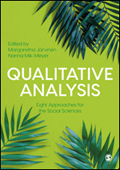
Demant, Jakob and Ravn, Signe. “Actor-network theory and qualitative interviews,” in Järvinen, Margaretha and Mik-Meyer, Nanna (eds.,). Qualitative analysis – eight approaches for the social sciences. Sage Publications, 2020.
Introducing eight analytical approaches that are key to successful social science research, this book helps you get to grips with theory and apply it to qualitative analysis. With two ‘matched chapters’ dedicated to each approach, it provides a balance between theory and analytical method. The first chapter grounds the approach in theory and the second uses real-world examples to show how to conduct your own analysis using the approach. More information...
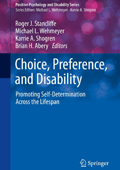
Laragy, Carmel and Fisher, Karen R. “Choice, Control and Individual Funding: The Australian National Disability Insurance Scheme,” in Stancliffe, R.J., Wehmeyer, M., Shogren, K., Abery, B.H. (eds.,). Choice, Preference, and Disability Promoting Self-Determination Across the Lifespan. Springer, 2020.
This book examines choice and preference in the lives of people with disability, focusing on people with intellectual and developmental disabilities. It provides an overview of choice and examines foundational concepts related to choice and preference, including self-determination and supported decision making. Chapters examine a range of critical service and policy issues, such as guardianship, individualised funding, the health care system, and the situation regarding choices for people with disability in international contexts. More information...
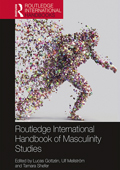
Ravn, Signe and Roberts, Steven. “Young masculinities Masculinities in youth studies,” in Gottzén, Lucas; Mellström, Ulf and Shefer, Tamara (eds.,). Routledge International Handbook of Masculinity Studies. Routledge, 2020.
The Routledge International Handbook of Masculinity Studies provides a contemporary critical and scholarly overview of theorising and research on masculinities as well as emerging ideas and areas of study that are likely to shape research and understanding of gender and men in the future. The forty-eight chapters of the handbook take an interdisciplinary approach to a range of topics on men and masculinities related to identity, sex, sexuality, culture, aesthetics, technology and pressing social issues. The handbook’s transnational lens acknowledges both the localities and global character of masculinity. A clear message in the book is the need for intersectional theorising in dialogue with feminist, queer and sexuality studies in making sense of men and masculinities. More information...
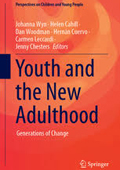
Woodman, Daniel et al (eds.,). Youth and the New Adulthood Generations of Change. Springer, 2020
Woodman, Daniel. “Social Change and Generation,” in Youth and the New Adulthood Generations of Change. Springer, 2020
Cook, Julia and Woodman, Dan. “Conceptualising Youth and Future Holistically,” in Youth and the New Adulthood Generations of Change. Springer, 2020.
This book investigates the life trajectories of Generation X and Y Australians through the 1990s and 2000s. The book defies popular characterisations of members of the ‘precarious generations’ as greedy, narcissistic and self-obsessed, revealing instead that many of the members of these generations struggle to reach the standard of living enjoyed by their parents, value learning highly and are increasingly concerned about the environment and the legacy current generations are leaving for their children and remain optimistic in the face of considerable challenges.More information...

Zinn, Jens O. Understanding Risk Taking. Palgrave Macmillan, 2020.
This book outlines and systematises findings from a growing body of research that examines the different rationales, dimensions and dynamics of risk-taking in current societies; providing insight into the different motivations and social roots of risk-taking to advance scholarly debates and improve social regulation. Conceptually, the book goes beyond common approaches which problematise socially undesirable risk-taking, or highlight the alluring character of risk-taking. Instead, it follows a broadly interpretivist approach and engages in examining motives, control, routinisation, reflexivity, skills, resources, the role of identity in risk-taking and how these are rooted in and framed by different social forces. More information...